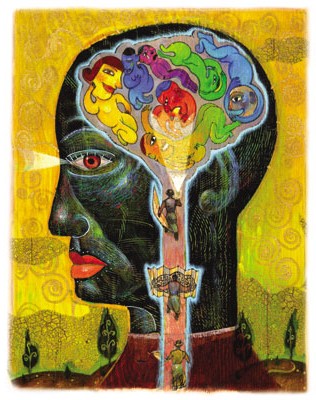 Wait.. Werent we taught about addiction in school? The police officer came to my third grade class and showed us a bunch of drugs and we were told how bad they were. We were shown videos of signs of violent drug users. Told to keep an eye out for people who have fists while they walk. So we can glimpse a little at the addictive qualities certain chemicals have but we were never told why a person chooses this. Why is the truth so alluding?
Wait.. Werent we taught about addiction in school? The police officer came to my third grade class and showed us a bunch of drugs and we were told how bad they were. We were shown videos of signs of violent drug users. Told to keep an eye out for people who have fists while they walk. So we can glimpse a little at the addictive qualities certain chemicals have but we were never told why a person chooses this. Why is the truth so alluding?An intriguing place to start is with the notion that people can become addicted to emotions. We sometimes forget we are made up of trillions of cells and view the world through chemicals.
Emotions can be viewed psychologically, spiritually, and an infinite array of perceptions. To view them as their chemical states seems to be a key to understanding our addiction to them. It seems true that a person may persist in one state of perception, causing particular emotions to exist, and thus a particular chemical to be produced. Over time a state of normality develops and we become more comfortable hanging around one set of chemicals than another. We develop a dependency on them.

With this in mind it starts to be quite easy to see why people become addicted to, well, anything. Someone may have an unending urge to play video games, read books, or talk. They all get a certain sense of themselves from doing so and chemicals are released and comfort develops. I personally dont think we are meant to live in one state for a long period of time. It seems to be quite damaging. "Everything in moderation" seems to apply even to something as immaterial as emotions even though we tend not to think of thoughts and emotions as things, but rather we see them as "I", when this is really not the case.
When people go through withdraw of a hard drug it can sometimes take weeks to overcome; a lot of time that is full of sweating and fighting an internal struggle of letting go. They used to use LSD to release people of such afflictions and the simple - heavy sessions therein would cure people of their addiction all together. High doses of LSD were given, the patient would then lay on the couch and would face the inner spaces of who they were and their relationship with reality. Supposedly they wouldn't need to go through the lengthy withdraw phase. This is because the user would have to face the aspects of themselves during their session; which were the root causes for their addiction.
After many years of study I still find it quite fascinating that all drugs mimic what is already in the human body. The drug could not work if the body did not already have the ability to use it. For instance THC from Marijuana forces the brain to produce an excess of normal happy chemicals thus making you "high". If you became very very happy without the drug you would feel the same way. I myself have been this happy and I did feel high and others asked me if I was. I was high on life.

I think if a balance in ones life is not attained, then, obviously, ones will naturally seeks ways to balance. In modern society it seems as if we do not know how to do that very well so we turn to sensations as a means to deliver us from what ails us. We in fact, more times than not, choose new ways to comfort ourselves. We cannot seem to put our finger on what ails us beyond comforts. I think ignorance is the culprit to this undeveloped mindset. We persistently deny the truth every time we choose comfort over the truth. "The truth hurts" is quite a famous and even cliche saying but if honestly considered, its undeniably true.
Buddha struggled with the notion of human suffering. It was in fact his life's work to find a solution to it. In the end enlightenment was the answer. This moment contains it all. If you learn to see suffering for what it is, and let it be as it must, then you have an opportunity to use it for what its meant for rather than let it use you until you become sick from trying to look away. We are far more responsible for our addictions than we like to think and until we learn to mature properly we will always live in immature attachment.
No comments:
Post a Comment